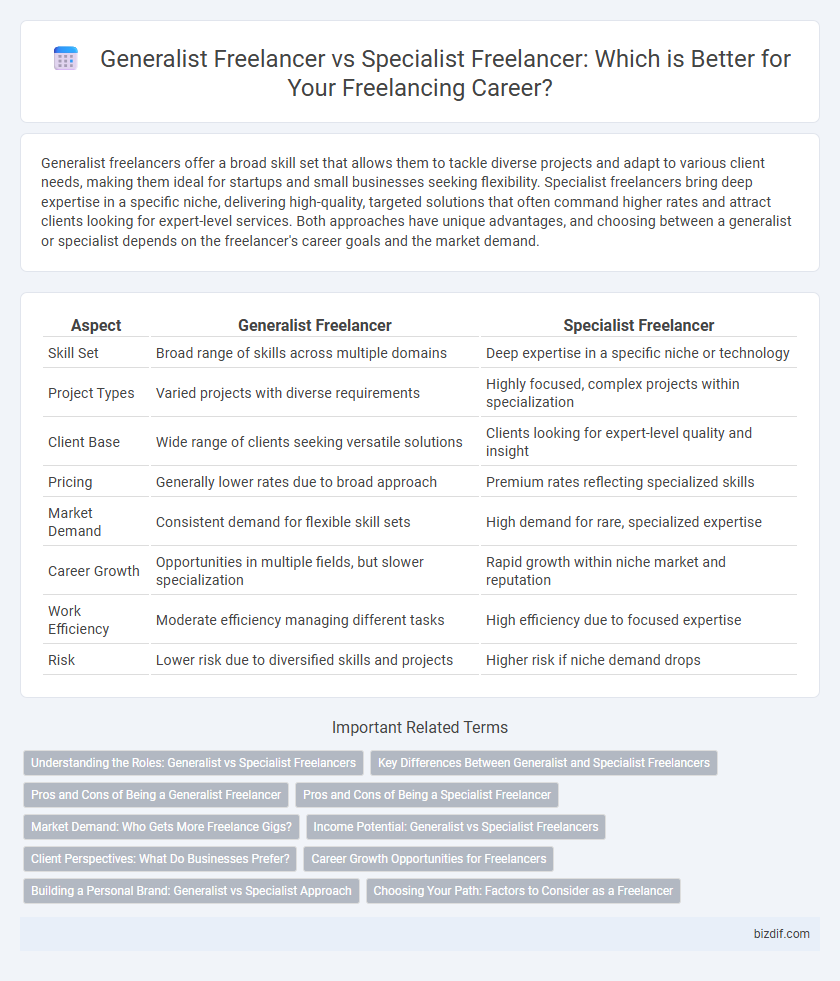Generalist freelancers offer a broad skill set that allows them to tackle diverse projects and adapt to various client needs, making them ideal for startups and small businesses seeking flexibility. Specialist freelancers bring deep expertise in a specific niche, delivering high-quality, targeted solutions that often command higher rates and attract clients looking for expert-level services. Both approaches have unique advantages, and choosing between a generalist or specialist depends on the freelancer's career goals and the market demand.
Table of Comparison
| Aspect | Generalist Freelancer | Specialist Freelancer |
|---|---|---|
| Skill Set | Broad range of skills across multiple domains | Deep expertise in a specific niche or technology |
| Project Types | Varied projects with diverse requirements | Highly focused, complex projects within specialization |
| Client Base | Wide range of clients seeking versatile solutions | Clients looking for expert-level quality and insight |
| Pricing | Generally lower rates due to broad approach | Premium rates reflecting specialized skills |
| Market Demand | Consistent demand for flexible skill sets | High demand for rare, specialized expertise |
| Career Growth | Opportunities in multiple fields, but slower specialization | Rapid growth within niche market and reputation |
| Work Efficiency | Moderate efficiency managing different tasks | High efficiency due to focused expertise |
| Risk | Lower risk due to diversified skills and projects | Higher risk if niche demand drops |
Understanding the Roles: Generalist vs Specialist Freelancers
Generalist freelancers offer versatility by handling diverse projects across multiple disciplines, making them ideal for clients seeking broad skill sets and adaptability. Specialist freelancers bring deep expertise in a specific field, delivering high-quality, targeted solutions that address complex challenges within their niche. Choosing between a generalist or specialist freelancer depends on project scope, complexity, and the client's need for either broad capabilities or focused proficiency.
Key Differences Between Generalist and Specialist Freelancers
Generalist freelancers offer a wide range of skills across multiple domains, enabling them to handle diverse projects and adapt to various client needs. Specialist freelancers possess deep expertise in a specific field, which often translates to higher rates and greater demand for complex tasks requiring advanced knowledge. The key differences between them lie in versatility, depth of knowledge, and market positioning, with generalists excelling in flexibility and specialists in specialized problem-solving.
Pros and Cons of Being a Generalist Freelancer
Generalist freelancers offer versatility by handling diverse projects across multiple industries, increasing their chances of finding consistent work and adapting to market shifts. They may face challenges such as lower rates compared to specialists and potential difficulty in establishing authority within niche markets. Their broad skill set allows for flexible client engagement but can limit opportunities for premium, highly specialized contracts.
Pros and Cons of Being a Specialist Freelancer
Specialist freelancers often command higher rates due to their deep expertise in niche areas, attracting clients seeking specific skills and solutions. Limited flexibility and reliance on a narrow market can reduce available job opportunities, increasing vulnerability to industry shifts and economic downturns. Strong specialization builds credibility and client trust, but may require continuous skill upgrades to maintain relevance in fast-evolving fields.
Market Demand: Who Gets More Freelance Gigs?
Specialist freelancers often secure more freelance gigs in niche markets due to their deep expertise and ability to solve specific problems efficiently. Generalist freelancers attract clients seeking versatility and diverse skill sets for broader project scopes, which can lead to steady work across varied industries. Market demand trends increasingly favor specialists in competitive fields like software development and digital marketing, while generalists thrive in roles requiring adaptability and multifunctional capabilities.
Income Potential: Generalist vs Specialist Freelancers
Specialist freelancers often command higher rates due to their deep expertise in niche markets, attracting clients with complex, high-value projects. Generalist freelancers may experience more consistent work variety but typically earn less per project, balancing volume over specialization. Income potential for specialists tends to grow with reputation and skill depth, while generalists benefit from flexibility and broader client bases.
Client Perspectives: What Do Businesses Prefer?
Businesses often prefer specialist freelancers for their deep expertise in a specific field, ensuring high-quality, targeted results and faster problem-solving. However, generalist freelancers attract clients seeking versatile skill sets that can adapt to various tasks and offer holistic project management. Client preferences typically depend on project complexity, with niche tasks favoring specialists and broader projects benefiting from generalists.
Career Growth Opportunities for Freelancers
Specialist freelancers often experience faster career growth due to their deep expertise and higher demand in niche markets, enabling premium pricing and exclusive contracts. Generalist freelancers benefit from flexible opportunities across multiple industries, which can lead to diverse clientele but slower advancement in competitive fields. Balancing specialization with versatile skills allows freelancers to maximize career growth potential and adapt to evolving market trends.
Building a Personal Brand: Generalist vs Specialist Approach
Generalist freelancers build personal brands by showcasing versatility across multiple skills, appealing to diverse clients and projects. Specialist freelancers cultivate a strong personal brand by emphasizing deep expertise and niche proficiency, attracting clients seeking specific solutions. Both approaches leverage targeted content and reputation management to enhance visibility and client trust in the freelancing marketplace.
Choosing Your Path: Factors to Consider as a Freelancer
Choosing between a generalist freelancer and a specialist freelancer hinges on market demand, skill versatility, and income stability. Generalists attract diverse clients by offering a broad range of services, while specialists command higher rates due to expert knowledge in niche areas. Evaluating your strengths, target industry needs, and long-term career goals ensures a strategic freelancing path aligned with personal growth and financial success.
generalist freelancer vs specialist freelancer Infographic

 bizdif.com
bizdif.com